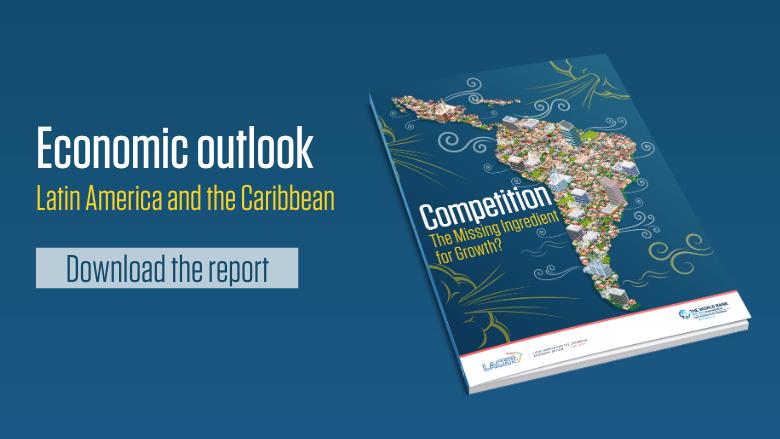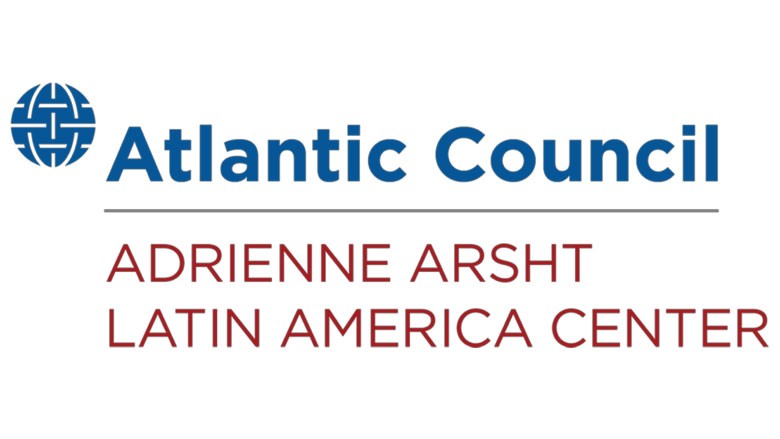Unlocking Growth and Productivity in Latin America & the Caribbean

Unlocking Growth and Productivity in Latin America & the Caribbean
- ABOUT THE EVENT
- TRANSCRIPT
- AGENDA
GO TO: SPEAKERS
Competition has been a powerful engine for economic growth and productivity. When markets were competitive, innovation flourished. This led to greater efficiency, lower costs, and, ultimately, greater choice for consumers. In Latin America and the Caribbean (LAC), this was a central debate. Despite the region making significant progress in economic stabilization over recent decades, growth had stalled in recent years. The regional economic review (LACER) by the World Bank, titled “Competition: The Missing Ingredient for Growth?” identified low levels of competition as an important factor contributing to low economic growth in the region.
What is the relationship between competition and economic competitiveness? How can governments and businesses work together to craft a framework that is conducive to higher competitiveness?
Atlantic Council's #ProactiveLAC Series
The conversation is part of the Adrienne Arsht Latin America Center’s #ProactiveLAC event series, which provides insight to countries in the region on how to advance economic reactivation and prosperity across Latin America and the Caribbean. Learn more and join us in person!
Watch the event with Spanish interpretation.
[JASON MARCZAK]
Good afternoon.
Welcome to the Atlantic Council.
I'm Jason Marczak, vice president
and senior director
of the Adrienne Arsht
Latin America Center here.
As part of our continued focus
on economic policy
and how to accelerate
the region's economic growth,
I'm absolutely pleased to be partnering
with the World Bank today
in its launch of their semi-annual
Latin American Caribbean Economic Review,
titled "Competition: the Missing
Ingredients for Growth."
Today we'll highlight new ideas
that will help
to hopefully further advance
our regional economic growth strategy
that is tied
to our broader Proactive Black Series.
It's a series that provides insight
to countries across the region
on how to emerge stronger
from the pandemic,
and also leap forward
in the region's developments.
We here see economic growth
as critical for more prosperity
for citizens all across the region
that will ultimately help to lift votes
from Mexico to Chile as well.
Growth impacts citizens votes,
helping to define political outcomes
across the region.
Just in the last weeks
we've seen elections in Mexico,
Dominican Republic,
where economy
was part of the decision voters had
when they went to the ballot boxes,
and ballot boxes in which they also
moved against the anti-incumbency trends
that we had seen historically.
From today's election cycle,
we see that the economy matters.
However, despite optimistic cases,
the World Bank finds that Latin America
and the Caribbean
has shown less economic dynamism
than any other region in the world.
The World Bank report
being launched today
forecasts that regional GDP will expand
by only 1.6% this year,
with GDP growth of 2.7 and 2.6%
for 2025 and 2026.
These rates are the lowest compared
to all other regions across the world
and, as the bank notes,
insufficient to drive poverty.
Despite solid macroeconomic management
in many parts of the region,
prospects for growth remain low,
partially because
of long unaddressed structural issues.
That one such issue
identified by the report
is the low level of competition
and the consequences
for economic competitiveness.
So what is the relationship
between competition
and economic competitors?
How can governments and business
work together to craft a framework
that is conducive
to higher competitiveness?
To deal with these issues,
I'm going to begin with a conversation,
a 15-minute conversation
with the chief economist
for Latin America and the Caribbean
at the World Bank, Bill Maloney.
Bill is one of the foremost
economic thinkers in the region.
Bill, I'm adding that to your title.
He is also a great partner
of the Atlantic Council
who leads, among other things,
the World Bank's thinking
on addressing the structural challenges
impairing growth in the region.
After my conversation with Bill,
Juan Carlos Lopez,
chief correspondent
for CNN en Español here in Washington
will moderate
a conversation with Marcela Melendez,
Santiago Levy,
Leticia Ossa Daza and Andrea Butelmann.
Bill, let me start with you.
It's great to have you here with us.
Thanks for the invitation
and thanks to the Atlantic Council
for hosting us.
Great to be co-hosting with you, Bill.
As we're launching this report,
I wanna take a step back.
The report has a couple chapters.
I'm sure many in the audience
have read the report
and seen the different chapters,
but chapter one addresses
some of the cross-cutting
economic challenges facing the region.
And I'll note that the report
begins by reconciling
the fact that Latin America
has fully recovered
GDP lost during the COVID pandemic.
Total employment
is close to full recovery,
although not in all groups,
and poverty
has fallen below its pre-pandemic level.
Yet the region
still confronts a global environment
that is very difficult.
What are some
of the general economic trends
that you're seeing in the region
as they relate to economic growth?
And also, why is the region stalling
in comparison to other parts
of the world?
[WILLIAM MALONEY]
Right. So, as you noted,
the Latin American
and Caribbean Economic Review
comes out every six months,
and the first chapter precisely deals
with the more conjectural elements,
how the region is doing
both with respect to itself
and to other regions.
And as you say,
the picture is very mixed.
On the one hand, in terms
of macroeconomic management,
it's been doing rather well.
Inflation, for instance,
is below that of the OECD.
And that's due to the very early
and determined actions
on the part
of the central banks of the region.
When they saw that inflation
was going to be a problem
long before the fed ramped it up.
So that's a testimony to the increased
professionalization and competence
of the macroeconomic authorities
in the region.
And it's something
we need to defend as a region.
On the other hand, we're not growing.
I think our figure at the time
was 1.6% for this year.
It might ease up a little bit
because some countries
have been performing better
over the last couple of months,
but that's still nowhere near enough
to alleviate poverty
and facilitate economic mobility.
And it's also not recent,
in the sense that we look at the 2010s,
the region was growing at about 2.2%
when the world was growing at 3.1%.
So we're consistently under-performing.
And that is a combination of,
in the short run,
it's a combination
of weak commodity prices,
low growth in Europe
and the United States,
uncertain growth in China.
But in the longer term,
there are structural issues
of many different kinds
that get in our way,
ranging from education problems,
to infrastructure problems,
to the structure
of our social protection systems,
to... and in this particular case,
we focus on the competitive environment
that our countries operate in.
Structural issues.
That chapter one
then leads to chapter two,
we look at competition trends
across markets in the region,
and you find
that that is a major contributor
to this stalling of growth.
I think you also make an important point
in the report,
which is that the lack of competition
leads to higher costs
for lower quality goods and services,
which also thereby then contributes
to higher inequality, right?
So that reverberating effect
that that has across economies.
So on a conceptual level,
why is competition
so important for markets
and how have you decided
to begin to further tackle this issue?
So competition among firms,
both domestic and international,
has a lot of potential benefits.
In the first place,
it lowers prices to consumers.
And so this
has a direct impact on poverty
and the basket of goods
that the poor consume.
If it's cheaper
because of more competition,
that works with us
in terms of reducing poverty.
From a growth point of view,
competition weeds out weaker firms
that are maybe absorbing resources
that could be better used
by more productive firms.
It also allows intermediate inputs,
higher quality intermediate inputs,
to be available to, precisely,
those more productive firms.
And helps them become even
more productive and grow faster.
And, finally, competition
is a stimulus to innovation in principle.
If you have to compete with other guys,
you are gonna try to be on your game.
And if you don't have to compete
the way, in many cases, we don't have to,
then you don't have to do much
to keep your market.
I want to go back to innovation
and some of the tradeoffs
that are noted in the report.
But as you note as well,
competition is a necessary feature
to achieve greater efficiency.
It's important,
as I mentioned, for lower costs,
ultimately greater choice
for consumers as well.
But the ultimate goal
should also be to achieve
more competitive economies at large.
And this sometimes means bridging this gap
between competition and competitiveness,
two distinct issues.
How can we translate competition
into greater competitiveness
for the region
and also do so in a way
that some of the firms
that rely upon lower competition
and those jobs are not displaced
in the interim?
Okay.
So in the first place,
exactly that stimulus to innovation
and to pushing the better firms
to become even more productive.
These are all issues that lead directly
to our firms being more competitive.
So productivity
is effectively competitiveness.
Now, what we found is that
if you increase competitiveness
in the domestic economy,
that leads to unambiguous benefits
in terms of greater productivity,
greater sales,
higher wages for workers in those firms.
It gets a little bit trickier
when you look at competition
internationally.
There, it's the firms
that are already kind of close
to the world levels of productivity
that innovate to escape that competition
and really benefit from it.
The problem
is that firms that are less close
in terms of productivity
and that can be a result
of weak management skills,
a weak workforce,
poor infrastructure,
difficult business rules within countries.
All those things make our firms
less productive and less competitive.
And therefore,
when they're confronted with competition
from China, from wherever else,
less able to compete.
So what's the policy mix
that's necessary then
to bring,
to upgrade firm level productivity
and make those firms
have the greater opportunity
to be able to bridge
those technological frontiers
and compete in a global scale?
Right, so you need
to work on several fronts at once.
In the first place, studies
of management quality in the region
suggest that our managers
have some work to do
to get to the global frontier
in terms of skills,
and in terms of, you know,
having a very competitive attitude
towards the rest of the world.
So working on firm capabilities
is important,
but on the other hand,
you need the entire...
system in which they work,
the supporting institutions,
be the universities,
think tanks or whatever,
and then all the relative regulations
and labor law around them.
All those things are very important
to having our firms being more productive
and hence more competitive.
So it's actually a big agenda.
One can say,
"Okay, we just need more competition".
That's true.
Except we need to work
on those things that hold our firms back.
And work on those things
in a sequential manner,
because now it can be done,
or in a complementary manner,
because not all can be done
at the same time.
How do you prioritize
all that needs to happen
to increase competition?
Well, you have to identify
the ones which are most binding
in any particular moment.
-And... and that varies by country.
-Yeah.
So, Bill, we always hear you
to make policy recommendations
that are actionable for policymakers.
After our conversation,
Juan Carlos Lopez
will delve
into some of the the nitty gritty,
our experts in the following panel.
But I want to also hear your perspective
on actionable policies.
You just mentioned a few steps
that could be taken,
but actual policies
the policymakers across the region,
or maybe in specific countries,
can take to foster
economic competitiveness
through competition policies.
What are some
of your primary recommendations here?
So I think one of the first,
the report provides
some of the first evidence
on the positive impact
of domestic competition authorities,
namely
where domestic competition authorities
have been more aggressive
in enforcing antitrust laws and the like.
We actually see precisely
this increase in productivity,
in sales, in wages.
And so that's unambiguously good.
That means we should be
strengthening those authorities,
which tend to be underfunded
and less independent than they should be.
So that's a place to start.
And when you get firms
more competitive domestically,
that also helps prepare them
to be more competitive internationally.
So that's one aspect.
I would say this emphasis
we put on firm upgrading is important.
And then the overall ecosystem
they work with.
Choose,
find the ones which are most binding
in each particular region or whatever,
and, you know, work with the firms
and find out which are the barriers
that are most preventing them
from improving.
Well, the report also mentions,
I was alluding to it earlier,
the tradeoffs that are inherent
insofar as protecting
existing jobs and firms,
but doing so
at the cost of forgone growth.
How do you move forward
on some of these policy recommendations
in this bridge between what's necessary,
domestic and international level,
with this knowledge
of kind of existing jobs
and firms that are dependent in many ways
on the lack of competition.
Right, I mean,
it is the nature of economic growth
that in any period of time
some firms are growing
and some firms are contracting.
That's exactly
what we call creative destruction.
And we can't be stopping that.
We want to progress.
My favorite example
is the Ford Falcon in Argentina,
which was still produced
in Argentina 15 years
after it was terminated here.
Why could it do that?
Because there was no competition.
If we had more competition
and allowed in Mitsubishi and Toyota,
would those workers lose their jobs?
Yes, that is a fact.
On the other hand,
there's a huge tradeoff there.
The way we have to do that,
on the one hand, we have to have
this openness to competition
and prepare people
to adapt to this, to competition.
On the other hand, we have to have
a very well-designed
social protection system
that allows workers
to move to new positions or to new jobs,
retraining, whatever,
that needs to be part of the practice.
At present,
our systems of social protection
are not really well designed for that.
You also mentioned the structural issues
that have to go
alongside the ramping up of firms
to be more competitive.
That, thereby, goes with the workers too.
Insofar as training workers
for the next generation
of job positions.
Absolutely, Latin America
still lags in basic measures
of mathematical ability
for 10th graders,
but substantially behind Asia.
So when we think of,
for instance, nearshoring,
if I have a choice to go
to Vietnam or to Mexico
at this point, you'd go to Vietnam,
the scores are substantially better.
So productive firms need to have
productive and well-trained workers.
It's good for everybody.
They get higher wages,
they've more opportunities.
-So we need to work on that.
-We do a lot of work here.
We have a working group
dedicated to nearshoring.
There's actually
a subsection of chapter one, I believe,
focused on nearshoring.
What are some of your initial takeaways?
Right, it's actually
a very cloudy picture right now
because if you look at the numbers,
there is not a huge flow back
from Asia towards Latin America.
Even in Mexico,
we're still below where we were in 2010
in real terms.
And flows still continue to Asia.
On the other hand,
when you talk to people
on the ground in the north of Mexico,
they say there's a huge demand
for industrial real estate and the like.
So we have to see what's going on.
But at present,
the aggregate FDI numbers
and the announcements
of greenfield investment
are not showing huge movements.
Bill, last question
before turning to the panel.
You before mentioned the importance
of innovation,
and that is an important issue raised,
the necessity to foster
greater innovation of industries.
How can innovation policy
be designed in a way
that contributes more
to economic competitiveness?
How do you do that
along the value chain as well?
Right. So that's critical.
And at present I'd say that in the region
our innovation systems
tend to be fragmented,
underfunded and disarticulated.
For instance, Latin America, I think,
is tied for Africa with the level
of interactions between universities
and the private sector and firms.
If you think of Silicon Valley
or Route 128,
that linkage between
Stanford and Berkeley,
or Harvard and MIT
and the local firms there,
that's absolutely critical.
And we have our smartest people
in universities,
and they're not talking
with the private sector.
That's a luxury we can't afford.
And I would also say
that our training systems
need to be more aligned
with the needs of the private sector,
and we need to be thinking
about schools
that provide technical training,
which is the lifeblood
of a modern economy.
But we don't really have that.
So there are a whole bunch of things
we need to do, to reform.
I'd call them second generation reforms.
And we're putting out a publication
in a couple of months
on this second generation reforms
of the innovation systems
of our countries, are absolutely key.
We'll look forward to having you back
and talking about that publication
when it comes out.
You also gave
a lot of great insight for now
the panel to have to address
and further detail.
-They can go and correct my mistakes.
-As Juan Carlos moderates that.
So I want
to again congratulate you, Bill,
and your incredible team
on a great report.
And thank you again, as always,
for the partnership with the World Bank,
For our audience,
those watching virtually,
you'll now see a brief video.
For those here in person,
I'll welcome Juan Carlos Lopez
and his panelists to the desk here.
And you also see a brief video
as they're taking their seats.
So again,
thank you so much for joining us.
Thank you so much, Jason.
-Thanks.
-Thank you.
Good afternoon, a pleasure to be here.
A pleasure to be with this group
and with our guests.
So let's go straight to the introductions
and the questions.
Sitting immediately next to me,
immediately next to me,
is Marcela Melendez,
Colombia national deputy chief economist
at the Latin American and Caribbean
Chief Economist Office of the World Bank.
Before joining the World Bank,
she served as chief economist
for the LAC region
at the United Nations Program UNDP,
where she led a knowledge production
to support policy design
and decision-making in the region.
We also have Leticia Ossa Daza,
she's the head of Latin America practice,
and a partner
in the Mergers and Acquisitions Group.
For over two decades, Leticia has advised
international and domestic clients
on successful mergers and acquisitions,
and other complex
cross-border corporate transactions.
We also have Santiago Levy,
who's a non-resident senior fellow
with the Global Economy
and Development Program at Brookings.
He was previously president
of the Latin America and Caribbean
Economic Association.
From 2008 to 2018, he was a vice president
for Sectors and Knowledge
of the Inter-American Development Bank.
From 1994 to 2000,
he served as deputy minister
at the Ministry of Finance
and Public Credit of Mexico.
And joining us remotely
we welcome Andrea Butelmann.
She has had a long and outstanding career
in the area of competition
and economic regulation,
both in the public and private sectors.
She was a judge
at the Chilean Competition Tribunal
and president
of the Antitrust Preventive Commission,
head of the Regulation Division
at the Ministry of Economy,
leading the drafting of regulations
for public services
and overseeing verification processes
in energy, water and telecom.
Welcome all.
Let's start with Marcela,
co-author of the report.
So I saw a quote,
and it's not from Karl Marx,
and it says that capitalism
without competition is exploitation.
And this was a quote by President Biden
in his State of the Union address.
Where I want to go with this
is when you look at the report,
you see a need for these policies,
but there's a resistance to it.
So what specific policies
do you think should be considered...
to be implemented
to contain big business,
the political power they have
and the apprehension
that they have of letting go?
What do you do?
Thank you for this question.
Indeed, the concentration
of economic power
translates very often into political power
and the capacity
to influence policy making
in directions that not necessarily look
for the public good.
So one thing
that we are pointing at in the report
is the need to think
what to do to somehow rebalance power.
One side of it, of course,
has to do with having
working competition policy
and competition institutions,
competitions laws and agencies
which are still young in the region
and still weak, very often
under-resourced in terms of their staffing
and in terms of the their funding.
And also very often weak
in terms of lacking the capacity
to actually translate
into enforcing good behavior.
We have lower sanctions
than in other places in the world.
And we don't have
enough capacity to prosecute
and, like,
to investigate everything that goes on.
So that's one part
that for sure has to do
with also controlling the political power.
Because as I was saying,
this economic power
that you gain in the market
translates into rent seeking behaviors,
which is what I'm going
to go into right now.
When you think about rebalancing power,
there are policies in other areas
that we should be looking at,
for instance,
regulating lobby, lobby behavior,
and the way a business interacts
with government officials
and with Congress.
Also, campaign financing
is another way to somehow control
and mitigate the way that business
has of influencing policy
in undesirable ways.
And last but not least,
there is an ongoing global conversation
about how to tax the super rich.
The region
is starting to take part on it.
And that's part of the story,
because the idea
is that we should have, of course,
fair reward
for productive activity in the market,
but we shouldn't allow rents
that are not directly resulting
from productive like rents,
as we call them,
that come from the exercise of
or abuse of market power.
And that translates into all
these possibilities to influence policy
in other directions.
The existence of this,
this weakness that I was talking about,
of competition policy institutions
in many countries
is in itself sometimes the response
of this political,
of this business political power
that has not allowed these institutions
to appear sometimes,
and to function as they should.
One thing that we should be also
thinking about when we think
about this competition policy institutions
is the institutional design.
In many countries,
it's the president
who names the directors or the leaders
of these competition policy institutions.
And when this happens, very often,
when there is an intervention
that touches big interests,
then the head of the competition agency
is easily removed.
This is something that acts exactly
against the way
we should expect this type of institutions
to work with.
So it's a change of the ship.
Andrea, you've seen it real time.
You've dealt with it.
So how does it work?
How do you go from competition
to competitiveness,
and how do you convince
this private sector
of the benefits of opening up?
We're not hearing you, so...
Andrea, we're not hearing you.
-So we're going to sort out the audio.
-I'm here.
I think we hear you now.
Yes.
Yeah. In Chile, we have gone a long way.
I think we have been
the first in the continent
to have a modern competition law.
We have independent judges.
We have an independent prosecutor.
We have never had a prosecutor
change for political reasons.
They all end up their...
Their period.
So I don't think
independence is a problem,
budget sometimes
is a problem for the prosecutor.
We would like to see a prosecutor
that goes against more cases,
that doesn't choose the winner only cases.
But when we tell them that,
they say, "We don't have budget,
so we have to choose."
So I think budget is a thing.
And, of course,
punishments are a big thing.
You have to detect the cartel.
So top rates, it's very important.
I think most countries have that.
Fines, the level of fines,
are very important.
We have been winning
the right to put higher fines in Chile
because of the very...
I'd say, responsible way
the tribunal has used them.
So first we had very low fines,
then they increased it,
but still they have like a ceiling,
independent of the size of the company.
And now we have finally a variable...
a variable calculation of fines
depending on the size
of the sales or the profits of the firm.
So I think it's a slow process too,
so people understand
that the competition authorities
won't go crazy.
So we get more and more power
as we are very responsible using it.
So finally in Chile,
we have criminal punishment for cartels.
Nobody has gone to jail yet,
but it's there.
Social disapproval
I think it's very important.
We have gone from business as usual.
People say, "Well,
but that's the way to compete."
And now it is an embarrassment,
a social embarrassment,
and the business associations
are being more and more vocal
against this kind of a practices.
Leniency is a very important tool too.
Coordination between regulators
and competition authorities
is very important
because regulators usually care more
about the stability
of the firms they control,
they regulate,
and not as much as... on competition.
So I think more,
more coordination is important.
And one specific topic,
but it's very important.
And we haven't touched it well
in Chile yet.
We have done some things,
but we are not there yet.
It's better systems
for designing the bidding rules
of government procurement.
In many times...
Sometimes because of ignorance,
sometimes because
people want to favor specific companies,
these bidding rules
are not very competitive.
So that's a problem too.
Now, you have to know your markets.
The big rules,
the overall rules are very important.
But to know how the markets work,
what are the barriers
and what are...
not the natural or legal barriers,
but the barriers
that the government build
to protect themselves from competition.
You have to understand that
and go straight to eliminate them.
You cut me if I'm going too long, okay?
But one thing we have in Chile,
and I'm not sure other countries do,
is... we have, we call it
"instrucciones de carácter general,"
general instructions.
Which the private persons have to abide.
And the tribunal can dictate these rules
if they don't go against the law,
or against any rulings or soft law.
So we did that, for example,
in the off-net on-net tariffs,
telecommunication tariffs,
Like the tariffs,
if you call within your network provider,
were very low.
But if you call another network
of the competition,
of a person
that is in the competitor network,
they would be very expensive.
So there was a lot of switching costs
and tariffs wouldn't go down.
So when we decided
that there couldn't be any difference
with off-net and on-net tariffs
and number portability was introduced too,
we had a fourth competitor
coming into the market,
and dramatic fall in mobile phone tariffs.
So that's one example
of knowing the market,
and go and fix what's going wrong.
Thank you, Andrea.
So I want to go to Leticia.
So you're on the other side,
you're dealing with these companies,
you're representing them,
you speak with them.
And you told me something,
when we sat down,
I asked you what you thought
and you said you're optimistic.
You're a lot more optimistic
than the reporters. Why?
Look, so I'm originally from Colombia.
I... and I feel the reason why
I created the Latin American practice
is because I'm very bullish.
Because of the opportunities, yes,
we need to work on many structural issues.
And I think, you know,
Red Report highlighted many of those.
I also believe that nearshoring,
even with, you know, the work
that has to be done on infrastructure,
also dealing
with political and legal instability
and under-scale workforce,
there is a potential, as a region,
to really overcome those issues.
We have been discussing
about the regulators,
like the authorities
on the antitrust side and all the laws,
also those are, as Marcela mentioned,
quite new in the region
compared to the U.S. and Europe.
But, and...
The independence
of these institutions is key.
And reinforcing that is very important.
But we saw it with Lava Jato.
The cooperation among authorities
to deal with that,
to prosecute, was there.
So I do believe, and we have
already talked about cooperation,
we have already talked
about the importance,
these issues are not also issues
that happen in one country.
We have more multilatinas,
so these issues
are happening in all the region,
also in the U.S. and also in Europe,
right?
So that cooperation, to me, is really key.
And the way I see really the region
overcoming all the structural issues
that are highlighted by the report
is really coming together
as a region itself.
And again, you know,
the example of the Lava Jato was there.
But also I would say
on the Fintech industry.
Fintech is booming in Mexico,
it is booming in Brazil.
And even if these issues still exist,
those are... like it is an industry
that has enormous potential.
And it is also because the private sector
and the public sector
have worked together.
Regulators have worked together
in figuring out how to have a spectrum
that really allows
for economic development
and also for capital to come.
The investment,
also thinking about long-term investments
and innovation.
So I think just replicating
by using these very positive examples
that we already have
is how, you know,
we will really get to the other side
and really have nearshoring
as the new El Dorado coming up.
Santiago, in 1993 you led the work
to draft
Mexico's first antitrust legislation
to regulate mergers and punish
anti-competitive business practices.
You also served as the first president
of the Federal Competition Commission.
What you did then, planning,
and what is happening now, how...?
What did you do right,
where do you see things now?
We did some things right
and we did a lot of things wrong.
We had a good law.
We had a structure of a competition
that was autonomous.
We failed to understand
that the power of these businesses
was so large that,
through various legal means, the "amparo",
which is a law of stay,
most of the resolutions
of the Competition Commission
would be neutralized or nullified
Because it would go to the judicial power
and then the tribunals
did not know how to deal with this.
Things have improved since then.
So now the tribunals
have specialized tribunals in competition
and we have specialized judges
in competition.
And there is now more movement.
But my take in this last almost 30 years
since I worked on this
is that we're still far from the promise.
We're far from the promise.
The amount of gains
that we had for consumers,
relative to the
concentration of power
and the concentration of rents
that is occurring
is still significantly unbalanced.
And then we missed something
that is very, very important
and that is in the report
and I want to highlight it.
If you read chapter two of the report,
and you should,
there's a very nice graph in chapter two
that talks about Latin America
being an area of the world
in which there are some few large firms,
this is what
we've been talking about so far,
and then there's a very large number
of small firms.
And nobody pays attention to that,
so I want to just think of the following.
Think of the market for bread
and think
there are only two firms, equal size.
One firm has 50% of the market,
the other firm has 50% of the market.
Maybe some kind of monopolistic
arrangement, cozy monopoly,
not a lot of innovation,
like what Bill was saying,
because there are two firms competing.
Now, suppose exactly the same.
There's one firm
that has 50% of the market
and now there's zillions of very,
very small firms making bread.
Each one with an almost infinitesimal
share of the market,
but when you sum them up,
they have another 50% of the market.
This large firm pays taxes,
pays minimum wages,
complies with social security regulations,
complies with all the laws.
And these tiny set of firms
don't pay minimum wages, don't pay taxes,
don't comply
with social security regulations.
Nobody pays attention to them
because they're tiny,
they're minimal firms.
But when you add them up,
they have 50% of the market.
Is that a competition problem?
Would that be sanctioned by the law?
If you read
the Latin American laws on competition,
none talk about unfair competition
in the product market
coming from the existence
of a large number of firms,
many of which
will be subsidized by the government
through micro-credits,
through special tax regimes,
through whatnot.
This is a part of the competition problem
that the report brings out
and I want to highlight that,
because the report's
a very nice way of saying,
"This is another dimension of competition
and we haven't paid attention to that."
One last point.
Marcela and Bill
talked about rent concentration.
So again, go back to the bread example.
Two monopolists or two duopolists,
you know, and they share rent somehow.
If you have an effective antitrust law
and you bring down prices,
not only you do reduce rents,
but you also increase the real wage.
In Latin America, we work all the time
with trying to increase the real wage
by raising minimum wages
and by doing all these things,
subsidizing this and that,
which is extremely costly and distorting
in other dimensions.
But if we did effective competition,
you could get the equivalent
of an increase in the real wage
without distorting the real market
and with the additional bonus
that you would improve
the income distribution and reduce rents.
So bottom line,
there's a lot to be done in competition,
but we have to widen our perspective
of what competition is,
to think about what's happening
with this large segment of firms
on the other side
that nobody pays attention to.
And then think about making
authorities much more effective
because they indeed can bring
about changes in efficiency and equity.
Not many policies in Latin America
can increase efficiency
and equity at the same time.
Competition is one of them.
How do you change the ship? How do you...?
You were saying very interesting things,
like you have to tax the mega rich,
you have to have better regulation,
you have to have strong authorities.
When they look
at the number one economy in the world,
it's going
completely against that direction.
There is more lobby, there is less taxing
and, depending
on what happens in November,
they're promising less taxes.
How do you do...?
How do you take that sector into mind
and bring them
into this competitive market?
You bring the conversation
to a difficult place
related to how we build
stronger social contracts in the region.
How do we understand that the only way
that we will have enough tax collection
to invest in development
is if we actually have
working labor markets and output markets.
And that's... So, so...
I... Sadly, I don't have the answer,
but I think... I want to say something
that hopefully sort of...
also responds to your question.
We started talking about policy
and I don't know if we've said high enough
that we have a problem
of very low competition
in most markets in the region.
We have very high markups on average
and we are up there,
where the developed world
is very worried that they are getting to,
so we've always been there.
That's the big concern and it has to do
with what Santiago was mentioning.
We somehow have managed to survive
with this very strange landscape
of productive activity
whereby we have
these giant firms on one extreme
and then a largely missing segment
of the small and medium firms.
And a lot of people in tiny firms
and self-employment.
Part of what we have there is a story
of 90% of the market, probably more,
not being able
to put any competition pressure
on the on their firms
that are at the very top.
I don't know how the mindset changes,
because I do think
that in some of our countries
we have a rentist mindset,
and that's
what we should be going against.
I have my... Maybe Andrea can correct me,
but I have the impression
that we're in countries
where competition authorities
have been stronger and have more standing.
There is a chip that starts changing.
When I see Chilean firms
operating in Colombia,
my own country,
they come with a different chip
than our own companies.
So I think it's a matter of...
I think it's a matter
of political willingness, in a sense.
The starting point.
And a relationship with power
and how you deal with authority.
A lot of Colombians here.
-Now...
-Yes.
Leticia.
There's also this angle
that more authority, more control,
slows things down.
And then it depends
on how efficient that authority is,
or how well versed
that authority is and what it's doing.
So sometimes
it could even hamper competitors.
Yes, and I think...
I will go to policy volatility, right?
Like one of the main issues
for foreign investment
is really not having...
not knowing what will happen, right?
And you're seeing it...
You saw it with Mexico,
with the energy reform.
You know all the progress that it took
to get to the energy reform
and then the changes again.
If you don't create that stability,
then it gets very...
it gets even more complicated.
So I think that
that will be really the incentive
because I believe that,
for the international players,
they need to know when they are
making a long-term investment
and, you know, some of the investments
that we need on our own infrastructure,
which are long-term investments.
You need to know
that there will be the certainty,
the legal certainty that it will be there
even if you have political changes.
And that's why, you know,
also the independence
of all these authorities
that we have been talking about
is also so key.
Andrea is it a... there's...
is there a cultural factor
on this whole process?
Because the way
you describe things in Chile
are a lot different with,
Leticia was mentioning Lava Jato.
So, is that also a factor
that made your job easier,
having a society that is more willing
to comply with these rules?
No, no, I think...
I think, as I said, when we...
I was like, in the first ten years
of this new authority.
So, when we came in, as I tell you,
most entrepreneurs thought that, you know,
doing cartels was business as usual.
So I think it's a process.
I mean, if the authority is effective,
it starts to build in the society
that these are wrong things to do.
And I think that after these 20 years
we have achieved that in Chile.
I mean,
I'm not saying there are no cartels,
but society doesn't accept them anymore.
And so...
But and...
I want to touch
on a couple of other issues.
Of course politic...
our political systems...
In Chile we have...
And this is very well touched
in the report.
Our political system in Chile
has 24 political parties and growing.
So politicians here at best
they care about the next election
and they don't care
about long-time welfare.
So if you're going to present them
a new law
that will destroy one job,
but will create...
that has the potentiality
to create a thousand other jobs,
they will reject it
just because of that one vote.
I am exaggerating, but it's true.
So, for example,
we have been discussing
the cabotage rules, you know,
in the Congress forever.
And they keep saying, "No,
we are going to lose a couple of jobs."
So we are a long country
with a long coast
and we don't use it for transporting,
because we have
a monopoly in cabotage.
And I think it has to do
with political structure.
But, they...
No party really is sure
it's gonna be there in five years
to respond to the policies they take.
But other thing
that I think is missing in the report
and I would stress it
is economies of scale.
Technology
has increased economies of scale
in almost every market.
So you cannot compare
competition in Chile,
in each Latin American country,
with a market like Europe
or a market like United States.
It's really unfair.
And it's impossible to get
to a level of competition
with our Island economies.
Because we are really islands
within Latin America.
So first I want to be...
to pledge, to erase the graph 2.2
in the report,
where you can compare
the depiction of the share of the GDP
of the 50 largest firms.
And of course Chile looks...
70% of the GDP in Chile is explained
by the 50 largest firms,
but we are 1/7 of Brazil economy
and we are 1/6 of Mexico economy.
So that comparison...
put on the the alarms
where it shouldn't be
and given our very bad political...
very low political...
with low-level political debate,
that graph can lead to a, you know,
a change of policy,
a very dangerous change of policy.
So you have to be very careful
in comparing countries
because it has consequences.
Andrea, I want to interrupt you,
I want to go with Santiago.
When you read the report,
the prognosis is that growth
is going to be slow, very slow.
Is there a time to implement this?
Is this something that can be done
in the middle of those long-range?
Is this mindset...
Can it be changed quickly enough
for growth to be where it should be?
It takes time,
but it's not so much a question of speed.
It's a question
of what Leticia was saying.
It's a question of policy consistency.
What you need
is get a good competition law.
It's not going to work well initially.
You're going to make mistakes.
Cases are going to bounce
with the judicial power.
It's going to take time,
but little by little you're going to build
the capabilities within the government
to do competition policy.
And, something that Andrea was saying,
the changes in society
such that this kind of behavior
is not business as usual,
but it's no longer tolerated
such that political parties
then reflect them into their platforms
and this becomes the law of the land.
This process has been extremely difficult
and I want to illustrate it
with something that is very sad,
what's going on right now.
So I started a Competition Commission
about 25 years ago.
In the previous administration
of President Peña Nieto,
there was a constitutional reform
to actually strengthen it.
Policy continuity.
During this administration,
the president
put forth a constitutional reform
to actually close down
the Competition Commission.
So if you're trying to tell society
this is an essential element
of the way the economy should function
and if we want to be competitive,
we need to have more competition,
and in comes a policy reversal that says
we're actually
going to disappear this agency.
This is, you know, useless not relevant.
It's very, very difficult.
So, to come to your question,
what's crucial is consistency.
Because it takes time.
It's not going to deliver 100% growth,
increasing the growth rate
in the very short run.
But over time,
it might just create conditions
that will increase productivity,
that then will increase
the growth rate over time.
And we haven't done
the homework 25 years ago
and we're suffering today
compared to other regions of the world.
So, you know, whatever is past is past,
but what is important,
and that's the message of the report,
is this is something
that needs to be done,
begin, or we already started,
have policy consistency and continue.
The report brings out something
very pedestrian but very important.
You need to put money into this.
These competition agencies,
not only a Chilean one,
you know, they're scratching for pesos.
The rate of return on this is huge.
For a little bit of extra money, you know,
we're talking about 50 million dollars,
100 million dollars,
the gains to consumers are huge.
So they have to put more money into this
and congresses
have to increase their budgets
and just do it consistently.
I want to open up the forum,
we've received questions from our viewers.
The first one is from Marlene Ortiz.
She's in Cajamarca, Peru.
"What is the importance of the education
for the competition to competitiveness,
unlocking growth and productivity
in Latin American countries?"
Who wants to take that one?
Education for this goal.
That's the importance of education.
The report makes a very strong point
of policy complementarity
We will not become more productive
just by having
working competition authorities
if we don't push the levers
in other directions.
Human capital is for sure one of them,
and like we've been talking,
Bill was talking about innovation,
how we have to work on preparing firms
to increase their firm level productivity
in order to be
actually prepared to compete
in domestic markets
and in foreign markets.
So I would say the importance of education
is that it's
like the very base of productivity, ¿no?
It's what... One of the very basic inputs
that we put into any production function
is our human capital.
And as long as we lag
in terms of human capital,
we will be lagging in productivity
and we will be not able
to face international competition.
That's my connection to it.
I don't know if that answers the question.
I'll add just one point
that was mentioned before,
all the relationships that exist
to really foster innovation
through the universities
and the private sector, that's key.
And that needs to happen.
It's happening at some scale
in different countries,
but it needs to happen in every country
and every university.
I have another question
and I wanna start with Santiago.
This is from Luis Fernando Peña.
He says,
"Corruption, especially in infrastructure,
neutralizes the competitive advantages
of countries
and makes
the use of nearshoring ineffective.
What good practices are there
to combat corruption in infrastructure?"
Excellent question,
64,000 dollar question.
Pray to God, that's policy number one.
Policy number two
is you've gotta clean procurement laws.
You've gotta be consistent with that.
A lot of the infrastructure projects
are government-led
infrastructure projects,
so procurement is central.
Transparency helps.
It doesn't go all the way,
but transparency helps.
And you just have
to go at it and increase sanctions.
Right now, the game
for a lot of these people is,
"If I get caught,
I'll be two days in the press.
It'll be a little bit shameful,
but three days later,
somebody else will be in the press
and people will forget, end of the story".
What you need to do
is spend five years in jail.
And then that changes behavior.
So we need to increase sanctions
and we need
to be more credible in the sense
that these kinds of behaviors
are not tolerable.
And we're not there yet.
So that's why corruption continues.
"For those in touch," Fred says,
"excited for Copa America this month.
<i>Vamos Argentina."</i>
So, and the last question is for you.
It says,
"Beyond just competition between firms,
what role can regional cooperation play
in boosting overall competitiveness
for Latin American countries?
Are there specific
areas where collaboration
could have a significant impact?"
The question is from Mohammed Abdurahman.
Okay, thank you.
Well, I think, as I said,
economies of scale
make our markets, especially Chile,
which I think is the smallest market,
impossible to compete.
I mean, we cannot have many companies
if the economies of scale are increasing
and the optimal size
of each company is very large,
maybe larger than our market.
So cooperation,
I wouldn't say cooperation.
I would say it's trade integration.
And that doesn't mean to be protectionism,
protectionist.
We are far away from the larger markets.
So we are already protected
by the distance.
So what I mean is more integration,
like infrastructure, customs,
many things
that we have to go to the details.
And maybe start thinking
of regional markets,
like for energy, for example.
Europe has...
a European market for energy,
the United States, of course,
and the mobile phone, transportation,
air transportation is very
balkanized in Latin America.
We don't give each other
permissions for frequent flights.
I mean, there is so much to go
in the road of integrating our markets,
to really be using
those economies of scale
to lower prices, to increase competition.
I know I'm daydreaming.
I mean, I don't see...
I mean, it's as difficult as...
I don't know which is more difficult,
Latin America integration
or improving our education.
So I want to say one thing
about education, please.
If you let me.
Please, be quick.
Yes, we have...
if you compare lower education levels
in Italy, Spain, and Chile,
they are almost the same.
35% of the people
have lower education levels.
But if you go to real skills,
I mean, ability to read,
ability to use some mathematical skill,
Chilean percentage go twice as much.
It's 70% of the people
don't know how to do...
how to read, how to understand,
or how to do basic
mathematical operations.
And in Italy and Spain,
it keeps being 35%.
I mean, those who have lower education
have lower skills.
So we're not talking
only about the level of education,
we're talking about quality.
We have one minute left.
Marcela, how optimistic are you
that you're sounding the alarm?
Are we paying attention?
Are the people
that have to pay attention listening?
We need everyone to amplify the messages.
I think people are not,
and historically have not been,
paying enough attention
to the potential that we'd have
if we were able to have markets
that actually work properly.
We have in the report a few examples.
There are not so many examples
that we have been able to quantify.
But we have some good examples
of what can happen
when competition institutions
actually work well.
In terms of the impact on productivity,
the impact on wages,
the impact on the working of markets,
and the impact on overall welfare.
So this is a concern,
the fact that markets
are extremely concentrated.
And let me say this,
it's not that we worry
about having large firms.
We actually want to have large firms.
We just don't want them to misbehave.
We don't want them to have rents
that come from misbehavior.
We want more firms to be able to grow,
and we want these big firms that we have
to allow other firms
to actually
enter the market and participate.
The message is not loud enough.
This is why we keep
sort of trying to point at it.
And there are,
we think, low-hanging fruits,
in terms of things that can be done
and that only really
require political will
and not so much spending resources
or anything to start.
Leticia, are you as optimistic
as you were when we started?
Yes, I'm still very optimistic.
We have the natural resources,
we have the Amazonas,
so there is no reason why not to.
And I completely agree.
Like, what's happening in Mexico,
we should all be very concerned about it
and really voice our concern.
Santiago, what do you tell the folks here
and the folks watching us?
What is the main point
they should pay attention to
and do something about?
Read the report and, you know,
competition, it sounds trite,
but we have a region of the world
in which we have a market economy
that doesn't deliver
the benefits of a market economy.
And it's extremely frustrating for people.
A lot of the political
dysfunctional ability
that we see in the region
comes from the fact that people
equate market economy equal privilege.
Market economy
equal concentration of power.
And then we have all sorts of experiments
all over the place, no policy consistency.
If we had functioning market economies,
eventually our politics
would be less dysfunctional.
Santiago Levy, Leticia Ossa Daza,
Andrea Butelmann,
Marcela Melendez, thank you very much.
-Thank you.
-Thank you.
Thank you everyone.










